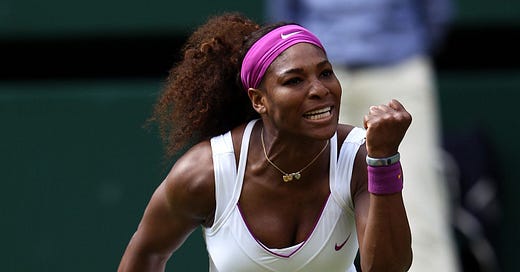Hello writing friends! I want to offer a warm welcome to all new subscribers—I am very happy you’re here. Thank you, old friends and new, for reading. And now onto this month’s free newsletter!
Today the U.S. Open starts in Queens, New York. In Arthur Ashe Stadium and on adjacent courts, the greatest tennis players in the world will hit that ball back and forth until there is a champion.
This year’s U.S. Open marks Serena Williams’ last professional tennis appearance—after the tournament, Serena, one of the greatest tennis players of all time, is retiring.
As some of you know, I am obsessed with professional tennis. Perhaps this is because although tennis has nothing to do with writing, it has everything to do with writing.
The most amazing thing to me about tennis is how the energy of a match can turn. A player who has been executing shot after shot begins to slip. Their opponent sees an opening, picks up the pace, starts hitting winners. Suddenly the previously faltering player is in control of the match. This reversal can happen dozens of times in a single set. It is a game that relies on attention and persistence. Sound familiar?
Many of these energy shifts derive from a basic truth: losing is perhaps the greatest human motivator. Who among us does not want to turn up the volume, to come out fighting faster and harder, to ultimately prevail? I am deeply ambivalent about the dangerous mythology our country and culture upholds around singular heroes who stay strong and tough, who win by working harder. But I am a human and I know what it is to be on the downswing, to be the underdog who longs to prevail. I am a writer who knows that the first thing I want to do after a feedback session is get back to my desk and make that writing better.
On the surface, tennis is a solitary sport, just two humans and the net between them. It’s easy to believe that tennis players who come from behind, who are able to set aside errors and reclaim focus and execution, are managing to do it on their own steam. I used to believe that great novels were created by a writer who sat at their desk alone until they’d produced a remarkable story, all on their own. But greatness is always a team effort.
One way that tennis players recenter when they’re off-balance is by looking at their box, the area in the stands where their coaches, trainers, family, and friends are sitting. These are the people who are closest to that player’s heart, their game. They know every weakness, they’ve been present for every triumph, consoled that player through myriad setbacks. The right look from the right person—the one that says You can do this!—can make a tremendous difference.
Writers have boxes too. Mine is filled with dear non-writer friends whose unconditional encouragement revs me like caffeine; memoirists, whose courage and insistence on the truth urges me to speak mine; and poets, who help me shape my sentences, see wondrous connections I did not, and weep when I weep. And of course there are novelists, people who intimately know the fight I’m fighting, who can empathize, share their own travails, and provide craft insight. It takes a village to raise a writer.
The other thing that turns a player’s momentum is experience and self-knowledge. They know they’ve been down before. They know how to claw their way out. They know which shots and maneuvers they excel at. They have the bravery and the intuition to pull the sharpest arrow out of their quiver and hit the bullseye. When writing is feeling rough, I work on dialogue, which I always enjoy no matter how down I’m feeling about my work, or pick up something I haven’t looked at in a while, which somehow engrosses me immediately, shaking off whatever cobwebs may be clinging.
My favorite male tennis player is Rafael Nadal, who is known for his obsessive tics, particularly his pre-serve routine. We can laugh all we want at Rafa picking his wedgies, but writers do this too. We light a candle, pour the tea, turn on the tunes, select the pen, say a prayer. Both writers and tennis players rely on ritual to ready our bodies and minds to perform.
I also like Rafa because he is sportsmanlike and sweet, always praising his opponents and graciously thanking everyone (including the crowd at the French Open in “French” that sounds very Spanish). He knows that cheering others on is cheering himself on.
I am sad to see Serena go, but my sadness is outpaced by my reverence for her peerless talent, for the way she has changed the game and changed minds, for her fierce and tireless insistence on being exactly who she is. Serena is six months younger than me, and although I do not labor under the illusion that I have much in common with her, I have enjoyed aging with her, watching her inhabit her greatness as I test out my own edges, see what I am capable of.
The swell thing about being a writer as opposed to a tennis player is I get better with age. If I’m lucky, my retirement is a long way off, which means it’s time to nod to my box, pick my wedgie, and get to work.






Who knew that writers and tennis go together? I love the way you made that connection. We have a lot in common in terms of our favorite players, too!